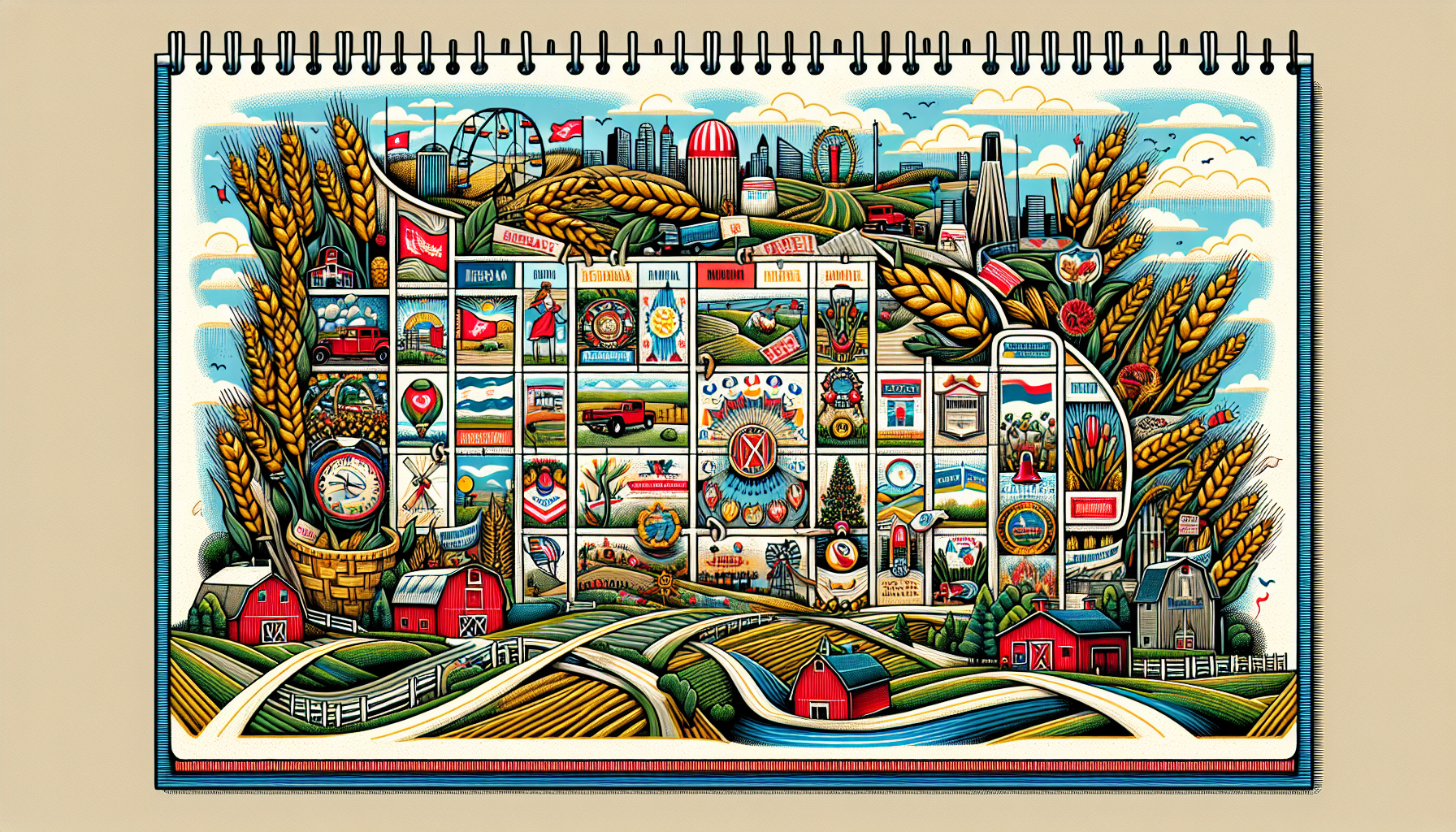Omaha Farmers Co Ops: Catalysts for Local Food Systems in Nebraska

Traveling through Nebraska, one of the most prominent agricultural states in the United States, it is inevitable to come across various farmers' cooperatives that have been instrumental in shaping the local food systems. The Omaha Farmers Co Ops, a network of farmers' cooperatives and markets, is an exemplary model of community-led initiatives that promote sustainable agriculture and support local farmers. This article delves into the intricacies of the Omaha Farmers Co Ops, exploring their history, structure, and impact on the local food landscape.
The Omaha Farmers Co Ops has its roots in the early 20th century, when local farmers began to band together to purchase supplies, share resources, and advocate for their interests. Over the years, the organization has evolved, adapting to changing agricultural practices, consumer demands, and policy frameworks. Today, the Omaha Farmers Co Ops comprises a network of independent farmers, producers, and cooperatives that share a common goal of promoting local, sustainable agriculture. The co-ops operate in various capacities, including direct marketing, wholesale distribution, and educational outreach.
A notable example of the Omaha Farmers Co Ops' success is the Omaha Farmers Market, held every Saturday from May to October in the historic Old Market district (11th and Jackson Streets, Omaha). This bustling market showcases the diversity of local produce, artisanal goods, and prepared foods. The market has become a staple of Omaha's food culture, attracting thousands of visitors each season. The market's organizational structure is a testament to the co-ops' commitment to community-led decision-making, with volunteer committees and member-led boards overseeing market operations.
Another example of the Omaha Farmers Co Ops' impact is the co-op's wholesale distribution arm, which supplies local restaurants, schools, and grocery stores with fresh, locally produced goods. This initiative has been instrumental in reducing the carbon footprint of the local food system, promoting economic development, and supporting small-scale farmers. Local businesses, such as the Omaha-based restaurant, The Grey Plume (220 S 31st Ave, Omaha), have partnered with the co-ops to source ingredients, thereby showcasing the co-ops' commitment to culinary innovation and community engagement.
In addition to the market and wholesale operations, the Omaha Farmers Co Ops engages in various educational initiatives, including workshops, farm tours, and advocacy campaigns. The co-ops have collaborated with local organizations, such as the University of Nebraska–Lincoln's Extension program, to promote sustainable agriculture practices, support beginning farmers, and develop policy initiatives that benefit the local food system. These efforts have culminated in the creation of a vibrant, inclusive food culture that celebrates the region's agricultural heritage.
The Omaha Farmers Co Ops' model has inspired similar initiatives across Nebraska, demonstrating the potential for community-led food systems to transform the way people produce, consume, and interact with food. As travel through Nebraska continues, exploring the local food landscapes and discovering the innovative work of the Omaha Farmers Co Ops is a must for anyone interested in food systems, sustainable agriculture, and community development.
The Omaha Farmers Co Ops serves as a testament to the power of collective action in shaping the local food landscape. Through their efforts, the co-ops have created a resilient, community-driven food system that not only benefits local farmers but also contributes to a more vibrant, inclusive food culture. As travelers navigate the Nebraska food scene, exploring the intricacies of the Omaha Farmers Co Ops offers a deeper understanding of the state's agricultural heritage and the innovative initiatives that are redefining the local food landscape.
In conclusion, the Omaha Farmers Co Ops is an exemplary model of community-led food systems, showcasing the potential for collective action to drive positive change in the local food landscape. By exploring the history, structure, and impact of the co-ops, travelers can gain a deeper understanding of the innovative work being done in Nebraska to promote sustainable agriculture, support local farmers, and create a more inclusive food culture.
The Omaha Farmers Co Ops has its roots in the early 20th century, when local farmers began to band together to purchase supplies, share resources, and advocate for their interests. Over the years, the organization has evolved, adapting to changing agricultural practices, consumer demands, and policy frameworks. Today, the Omaha Farmers Co Ops comprises a network of independent farmers, producers, and cooperatives that share a common goal of promoting local, sustainable agriculture. The co-ops operate in various capacities, including direct marketing, wholesale distribution, and educational outreach.
A notable example of the Omaha Farmers Co Ops' success is the Omaha Farmers Market, held every Saturday from May to October in the historic Old Market district (11th and Jackson Streets, Omaha). This bustling market showcases the diversity of local produce, artisanal goods, and prepared foods. The market has become a staple of Omaha's food culture, attracting thousands of visitors each season. The market's organizational structure is a testament to the co-ops' commitment to community-led decision-making, with volunteer committees and member-led boards overseeing market operations.
Another example of the Omaha Farmers Co Ops' impact is the co-op's wholesale distribution arm, which supplies local restaurants, schools, and grocery stores with fresh, locally produced goods. This initiative has been instrumental in reducing the carbon footprint of the local food system, promoting economic development, and supporting small-scale farmers. Local businesses, such as the Omaha-based restaurant, The Grey Plume (220 S 31st Ave, Omaha), have partnered with the co-ops to source ingredients, thereby showcasing the co-ops' commitment to culinary innovation and community engagement.
In addition to the market and wholesale operations, the Omaha Farmers Co Ops engages in various educational initiatives, including workshops, farm tours, and advocacy campaigns. The co-ops have collaborated with local organizations, such as the University of Nebraska–Lincoln's Extension program, to promote sustainable agriculture practices, support beginning farmers, and develop policy initiatives that benefit the local food system. These efforts have culminated in the creation of a vibrant, inclusive food culture that celebrates the region's agricultural heritage.
The Omaha Farmers Co Ops' model has inspired similar initiatives across Nebraska, demonstrating the potential for community-led food systems to transform the way people produce, consume, and interact with food. As travel through Nebraska continues, exploring the local food landscapes and discovering the innovative work of the Omaha Farmers Co Ops is a must for anyone interested in food systems, sustainable agriculture, and community development.
The Omaha Farmers Co Ops serves as a testament to the power of collective action in shaping the local food landscape. Through their efforts, the co-ops have created a resilient, community-driven food system that not only benefits local farmers but also contributes to a more vibrant, inclusive food culture. As travelers navigate the Nebraska food scene, exploring the intricacies of the Omaha Farmers Co Ops offers a deeper understanding of the state's agricultural heritage and the innovative initiatives that are redefining the local food landscape.
In conclusion, the Omaha Farmers Co Ops is an exemplary model of community-led food systems, showcasing the potential for collective action to drive positive change in the local food landscape. By exploring the history, structure, and impact of the co-ops, travelers can gain a deeper understanding of the innovative work being done in Nebraska to promote sustainable agriculture, support local farmers, and create a more inclusive food culture.
